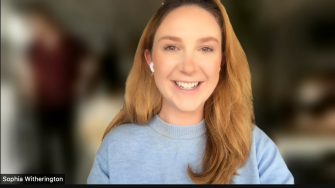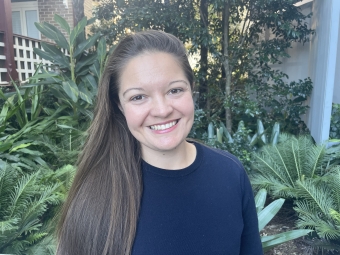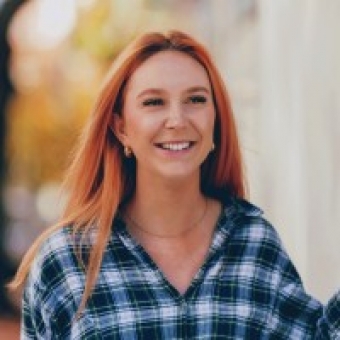
According to Sophia Witherington, Head of Fellowship at Startmate, the local start-up scene is booming.
“Venture capital investment into Australian tech has massively increased and evolved in the past 10 years,” Sophia says.
“Previously, top founders and talent would go overseas in search of investment or jobs, but they’re now staying here. Meanwhile, many of the serial founders and seasoned operators who migrated overseas are returning home because there’s so much cool stuff happening Down.”
Sophia and her colleagues at Startmate are building a platform which connects start-up companies who are looking to hire with developing and passionate talent.
As part of this, they run fellowships to drive change in the start-up ecosystem. One of them is the Women Fellowship, which helps ambitious women secure their dream start-up roles. To enable this, Sophia partnered with the AGSM @ UNSW Business School to help identify current MBA students and alumni who might benefit from the Women Fellowship.
Kiara Olrich, previous Director at Nous Group and now Head Of Operations at Phantm, was one such AGSM MBA student, who in July 2021 became the first hire at Phantm; a start-up that converts organic and food waste into a natural material that is home compostable and fully biodegradable in soil or water in a matter of weeks.
AGSM spoke to Kiara and Sophia about the role of the AGSM MBA program in the start-up space and why the start-up ecosystem presents so many great opportunities for future graduates.
What were your professional lives like before you entered the Sydney start-up scene?
Sophia: Before I moved to Sydney about four years ago, I worked with private equity funds in London in executive search, and in assessing leadership capability in pre-deal portfolio companies.
Kiara: I worked for Nous Group in management consulting here in Sydney for almost seven years. I had a lot of freedom and autonomy – and a lot of self-management. There was a lot of support for learning and growing, and I thrived in that environment.
Sophia, what made you decide to leave private equity and enter the start-up world?
Sophia: When I came to Australia, I wanted to stay in private equity, but my role didn't really exist here. So, I shifted to the venture capital and start-up world.
When I pivoted into start-ups, I found I was increasingly meeting extremely intelligent, ambitious people driven to make a difference. They were super smart and hustled every single day. It was infectious. I then saw an opportunity in the ecosystem, and decided it was a problem I wanted to play a part in tackling. The sparks were flying, and all the right ingredients were there.
And what about you, Kiara? Why did you transition from working at Nous Group to working at a start-up?
Kiara: My AGSM MBA was a stepping-stone for me. I enrolled to take a break from – not necessarily leave – Nous. I wanted to reflect on my leadership, get exposed to global perspectives, and gain a bit more commercial acumen. I was also lucky enough to receive the Luminis AGSM Wharton Business Innovation Scholarship from AGSM, which made my study possible. I couldn’t have taken 18 months out of my career otherwise.
Through the MBA I changed so much as a leader. What was important to me and the type of work I wanted to do changed too. It exposed me to innovation and sustainability and the crisis our planet is facing in the coming decade. And it highlighted that we need the best brains working on those problems. I figured start-ups provided the same benefits as Nous – great team, great culture and I could help shape the business from the beginning– as well as having a much more direct impact on solving our global sustainable development goals.
How has your experience in the start-up space been different from your prior corporate experience?
Sophia: In private equity, status was incredibly important. I wore heels and dresses to work every day, I had to bite my tongue in meetings, and I knew my place. In start-ups, and Startmate specifically, it doesn't matter what school you went to or what your background is. If you have good ideas and you’re ambitious, seniority doesn’t matter. This creates a domino effect of diverse ideas and inclusivity. That's where the good stuff happens.
I now live in start-up T-shirts and athleisure. I haven’t worn a pair of heels in over four years (and I’m very happy about it).
Kiara: I also love that the start-up space is really flexible and adaptable. When you’re building something from scratch you can really shape what you're doing because you're not limited by as much governance or bureaucracy as you would be in an established organisation. You can be truly innovative and have a really clear individual impact. In a small team, like in consulting, you know exactly what you've done and what’s made a difference. But unlikely consulting, you are responsible for more than just the best practice advice, you are also operationalising it.

Kiara Olrich, Head Of Operations at Phantm, AGSM MBA 2021
Kiara, what does your role as Head of Operations at Phantm entail?
Kiara: My role has two main segments. One is business operations - making our team as effective as possible by designing and streamlining the way we work. Right now, we’re a small team with a mix of contractors and employees working remotely and largely asynchronously. So, the operations work has involved accelerating our adoption of Asana to optimise information flows and facilitate meeting rhythms.
The second part is leading cross-functional strategy and research projects. Lately, I’ve been leading our downstream processing and applications work. As our technology development work is progressing positively, we are now assessing, validating and activating opportunities for research and product partnerships for our next stage of growth. I’m also leading grant proposals as part of our fundraising activities for this next growth stage.
What parts of your AGSM MBA do you use at Phantm?
Kiara: In this transition to a totally new role and sector, I am using a lot of the leadership skills and tools we learned in the Foundations of Management three-week intensive course. It covers great tools for leading yourself and others.
For example, the practice of active reflection – I do that weekly. I have a specific journal for weekly reflections – a gift from one of my MBA colleagues with my name on it. I think about what I’ve learned over the week, what I’m proud of, how I’ve impacted others as a leader and what I want to prioritise in the weeks ahead.
I’ve also been using many of the frameworks in my strategy and entrepreneurship toolkits. In my role so far, I’ve been assessing market opportunities for their attractiveness to enter with Phantm’s platform technology and thinking through how to design a winning product strategy and a scalable business model.
Sophia, what’s your role at Startmate?
Sophia: As Head of Fellowship, I support both the development of the talent who go through our programs and the hiring of our talent by start-ups.
I also manage a team of program leaders, working on the strategy and vision of how we're affecting the ecosystem, deciding which programs to launch, building relationships in the ecosystem so companies can hire, and then guide a team who run the programs on a day-to-day basis.
Kiara, you finished up a two-month Startmate Women Fellowship in May, 2021. What was that like?
Kiara: It was amazing. I started my fellowship when I was in the last month of the AGSM MBA, so my focus was on finding the right start-up role. The fellowship had sessions on different start-up roles, inspirational talks from women who have made the jump into start-ups and female founders.
One of the great things about the program is they encourage you to shine as a woman – whatever your strengths are or whatever you’re interested in. So in addition to the planned sessions, there are openings for any fellows to facilitate sessions for the whole cohort.
There’s a lot of networking and coaching sessions, too. It’s all designed to help find out where you fit in a start-up and how to make that transition when you’re ready.
What makes female representation in the start-up world and equal access to opportunities so important?

Sophia Witherington, Head of Fellowship at Startmate
Sophia: Women only hold about 30% of tech roles, even though studies show the more diverse teams are, the better business results are. Instead of watching the ecosystem organically and incrementally moving this needle by hiring a few women a year, Startmate is making a tangible difference by helping 200 women a year secure their dream start-up jobs.
For us, it’s really important to have a women-only fellowship to help explore themes and concepts around building confidence, imposter syndrome, how you negotiate salaries, and how you deal with working in a male-dominated environment. We want women to have a home to return to where they are supported by kindred spirits.
There's a lot of magic in not only women supporting women, but also male advocates and allies also being on board with this mission.
What makes AGSM MBA students and alumni so well-suited for the start-up world?
Kiara: One reason is there’s a core unit on Entrepreneurship and Innovation where we work on start-up ideas over 12 weeks. You’re given the tools to go and run customer interviews, get feedback, get validation, do the things that you would do if you were scaling a business. It’s a really hands-on experience that’s core for everyone doing the MBA.
UNSW also has a great Founders Program that stretches across the whole university, not just in AGSM. Many of my peers did the New Wave Founders Program, which lets women founders form a team and practice the whole validation pitch and build those skills.
Of course, Sydney is the hub of start-ups in Australia, and then because AGSM is a global program, you can connect with alumni across Australia and internationally.
Sophia: We love the phrase, ‘back the hungry, not the proven’. AGSM MBA candidates are present and active. They’ve realised they want to make a change, and they’re going to go about learning as much as they can. There is a definitive hunger and thirst for learning, a curiosity about the world and where they fit into it.
During an AGSM MBA, students develop a holistic view of how the whole business world fits together. And that broad lens enables them to be open-minded and think holistically about where they fit in and what they want to do after graduation.
AGSM has really helped us amplify our mission and the students and alumni we’ve had through the program have gone on to do interesting work. It’s such a natural fit.
What should people consider when they’re trying to decide if the start-up environment is for them?
Sophia: It's important to consider your realistic risk appetite. Can you take a salary cut? Do you want to have an intensive role at an early-stage start-up or do you want to join something like Atlassian or Canva, where you can still have that entrepreneurial, fast-paced environment but there might be more stability around pay and company success?
Another is to kill your darlings. Some people get hung up on titles and roles, when it often doesn't matter. You’re going to work for some incredible people, and your title will probably change quickly. Take the incredible opportunity in front of you and think bigger than just the title.
Also, you get out what you put in. The start-up community is incredibly rich and very community and relationship driven. How do you think about building your network to figure out where you fit in and what that could mean for you? While at the same time, keeping an open mind.
Kiara: Not all start-ups are the same – what type of culture and what stage of the start-up do you want to enter? I wanted an early-stage start-up because I wanted to shape the culture. If you're earlier in your career, you might want to go to a more established one that has more structure to help you learn.
The second thing is to think about the problem you want to solve. One person in a start-up will probably have a much bigger impact than one person in a corporate. So pick the thing that you want to make a difference in, whether that’s sustainability, future of work, artificial intelligence. That's just as important to founders as your skills and your strengths.
Sophia: It’s such a sensational time to be joining the start-up ecosystem. It's big enough that there's plenty of venture capital money flying around. Unicorns (a terminology used for billion-dollar companies) are generating at the rate of 1.5 a year, and that’s only going to grow. There are plenty of good roles, and plenty of impact-driven, meaningful start-ups. You no longer need to be a cog in the wheel. You can have a role that has a massive impact across an organisation.
To learn more about AGSM’s globally-ranked MBA Scholarships, click here.
To learn more about AGSM’s globally-ranked MBA program, click here.
To find out more about AGSM @ UNSW Business School, click here.
